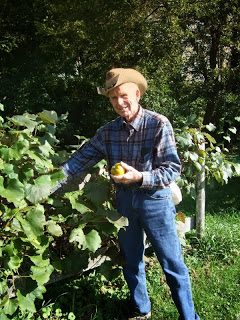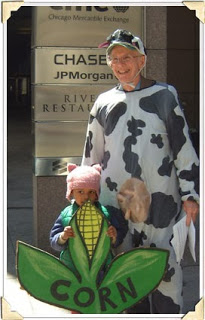 Last week, the family farm movement lost one of its leaders, Wisconsin dairy farmer and activist John Kinsman. John, aged 87, was the consummate farmer: hardworking, tireless, humble, nearly always with a smile on his face. Until just recently he was still farming, milking his small herd of Holsteins and tending the 150 acres that enabled him and his wife Jean to raise ten children.
Last week, the family farm movement lost one of its leaders, Wisconsin dairy farmer and activist John Kinsman. John, aged 87, was the consummate farmer: hardworking, tireless, humble, nearly always with a smile on his face. Until just recently he was still farming, milking his small herd of Holsteins and tending the 150 acres that enabled him and his wife Jean to raise ten children.
John’s refusal to use chemicals on his land following an illness caused by farm chemicals was an early sign of the radical beneath his farmer exterior. He was an organic farmer for more than 50 years, turning his back on the agricultural education he received that promised chemicals as the savior of farmers. The photo Farm Aid featured in John’s Farmer Hero profile from a couple years back shows John on his land, wearing what looks to be a typical farmer’s seed cap. Upon closer examination, one can see the hat represents the MST, Brazil’s landless workers’ movement. The others in the photo represent different cultures and ethnicities—just a few among the likely hundreds of people John mentored on his farm and across the globe. The photo is a clue into what those of us who love and admire John know: here is citizen of the planet. Not just an upstart on his own piece of land, but an activist and leader in uprisings and actions across the world.
In the ’60s, John became involved with a summer exchange program called PSA (Project Self-Help and Awareness), whereby young black kids from Mississippi spent part time on farms in Wisconsin and Wisconsinites went south to shift their worldview. In the ’70s, he became a leader of that organization. In the ‘80s, he started a life-long commitment to fight GMOs by protesting at the University of Wisconsin. The agricultural school was experimenting with bovine growth hormone (rBGH) and serving milk and ice cream containing the hormone to their students. In the ‘90s, he founded Family Farm Defenders, a Wisconsin-based group and partner of Farm Aid’s, which promotes sustainable agriculture, fair trade, workers’ rights, animal welfare and food sovereignty. In 1999, John stood shoulder to shoulder with Jose Bove at the World Trade Organization demonstration in Seattle, protesting globalization by raising his voice and handing out fair-trade cheese, made by Wisconsin dairy farmers who were paid a fair price. Most recently, John was protesting the Trans Pacific Partnership (TPP), another trade agreement that threatens farmers and eaters alike, here and abroad.
John was a leader of the National Family Farm Coalition, which stands up for family farmers and rural communities in the United States. He was a farmer leader of Via Campesina, a movement of and by peasant farmers across the world for food sovereignty. He was an outspoken critic of globalization, the commoditization of our food, the lack of transparency in our food system, and the corporate power that keeps farmers from earning a fair living. John was a mentor to hundreds (perhaps thousands), recognizing the power and energy of youth as a force to be harnessed for change. Dressed in a cow suit to call attention to corporate price manipulation outside the Chicago Mercantile Exchange, or talking one-on-one with a young farmer, John was a joy and inspiration. Above all, he was a friend.
I had wanted to pay tribute to John in a way that allowed me to really reflect on the meaning of his life and work. I wanted to first celebrate his life at his service, to be among the people who knew him best. Some of those people were unable to attend, it being the busy season for farm conferences and with the Farm Bill moving. They said, “John would have wanted me to keep working.” And they’re right. Regardless, the church overflowed and I know that on that cold day in La Vallle, WI, people across the world were paying tribute to John, and will keep on doing so. We celebrate the life of a man who may have worked the same plot of land for the majority of his life but who traveled the world (all the continents but Antarctica) and who affected and empowered many in the pursuit of fairness for those often unseen and powerless.
The loss of this great family farm defender, coupled with the death of Pete Seeger, has made me very thoughtful of two lives that have given so much inspiration to all of us to keep going with. John and Pete are two people cut from the same cloth—-two individuals who believed in the power of people, very simply. I think that if we remember them and the way they acted in the world, with their smiles and music and always with strength to empower others, we can keep doing the good work they started.
I am very grateful that I knew John and could call him my friend.



